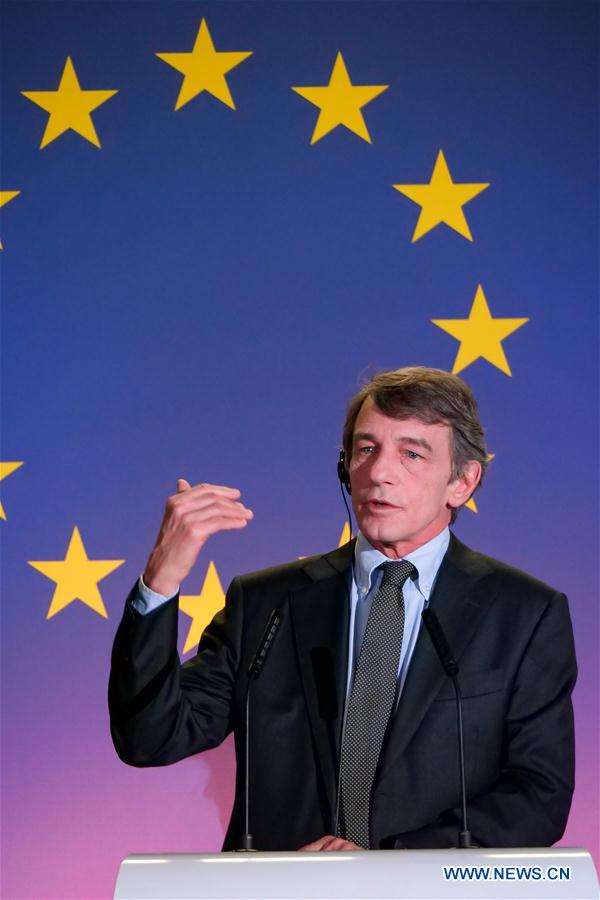
European Parliament President David Sassoli speaks at a press conference on the future of Europe at the Parlamentarium in Brussels, Belgium, Jan. 31, 2020. The United Kingdom's (UK) withdrawal agreement will enter into force upon the UK's exit from the EU on Friday night, ending the country's 47-year membership. (Xinhua/Zhang Cheng)
BRUSSELS, Jan. 31 (Xinhua) -- Top European Union (EU) leaders sent a message of unity and hope on the day of the United Kingdom's departure, vowing that a smaller bloc would not translate into a weaker one.
Presidents Charles Michel, David Sassoli and Ursula von der Leyen, respectively of the European Council, the European Parliament and the European Commission, stood together on Friday morning to deliver remarks meant to elicit optimism and energy on the day when they lose one of the bloc's most important economic, political and military powerhouses.
"We stand at a new departure for Europe. We should not forget how much stronger we are when we act together," said Sassoli.
"It's never a happy moment when someone leaves but we are opening a new chapter. We will devote all our energy to building a stronger, more ambitious EU. With 27 strong democracies, strong values, freedoms, 22 million businesses, and the biggest single market," said Michel.
"Indeed, tomorrow, almost half a century of the United Kingdom's membership of the European Union is over. When the UK joined -- I was still at school -- we were six Member States. Tomorrow we will be 27 Member States," said von der Leyen.
"During all these years ... our Union has gained political impetus and has become a global economic powerhouse. Our experience has taught us that strength does not lie in splendid isolation but in our unique Union," she added.
LESSONS FROM BREXIT
Despite their upbeat rhetoric, the leaders were pressed by questions what lessons the EU have learned.
"It's essential in the future to take much more into consideration the expectations of the European citizens towards the European Union. It's also very important to explain what is the daily added value of this political project," Michel said, referring to the concept usually repeated by pro-EU figures that the EU is not a perfect final product but an ongoing process that constantly needs adaptations and perfections.
Von der Leyen stressed the unity, saying within three and a half years of Brexit, there was a very precious experience -- the 27 other EU member states sticking together.
To the surprise of many observers, during the Brexit negotiations, the EU27 held together around Brexit negotiator Michel Barnier to square off with London, where bitter divisions unseated the government of then Prime Minister Theresa May.
"It's way more than each single country would ever have on its own, and we make the experience how strong we are defending our values, our interests but also protecting our member state Ireland. And therefore this experience of being together and solving problems together was a valuable one," she said.
FUTURE PRIORITIES
The EU leaders also took advantage to highlight the bloc's priorities despite Brexit.
Von der Leyen, in charge of the executive branch of the EU, said the challenges that Europe faces, and the opportunities that it can grasp, have not changed because of Brexit, "It is the climate change and the European Green Deal. It is being at the forefront of the digital revolution. It is managing migration in an effective and humane way. It is building strong partnerships across the globe."
Another priority will no doubt be the coming negotiations between the EU and UK on their future relations. Brussels sent clearly signals that it wishes the best possible relationship with the UK. "But it will never be as good as membership," von der Leyen said.
The EU has maintained that how much London remains aligned with Brussels' rules will determine its access to the single market, the UK's largest trading partner.
"The more the UK will diverge from EU standards, the less the access to the single market," Michel said.
